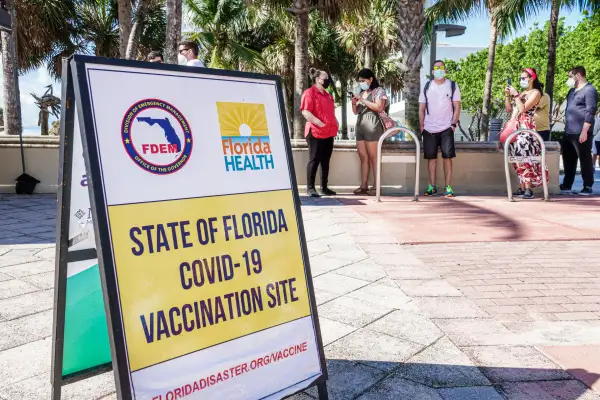Is Delta's Plan to Charge Unvaccinated Employees Extra for Health Insurance Even Legal?

Delta Air Lines made headlines amid the Delta variant of COVID-19 this week when CEO Ed Bastian announced that unvaccinated employees in certain plans will have to pay a $200 monthly surcharge for health care starting this fall.
Financial consequences for Americans who ignore medical advice and choose to remain unvaccinated have been mounting lately, and workplace-specific vaccination mandates were always going to spike with the Food and Drug Administration's approval of the shot. But the health insurance angle represents a twist in the narrative — and raises some legal questions.
Are companies actually allowed to make unvaxxed workers pay more for health care? How can they do that?
At Delta, where 75% of the 74,000 employees are vaccinated against the coronavirus, the decision is likely meant to motivate holdouts. At its core, though, it's motivated by money.
"The average hospital stay for COVID-19 has cost Delta $50,000 per person," Bastian said in a staff memo. "This surcharge will be necessary to address the financial risk the decision to not vaccinate is creating for our company."
Like many large companies, Delta has what's called a self-insured (or self-funded) plan, meaning it takes on the financial burden for employee health care and pays claims itself. UnitedHealthcare administers the plans. And while the Health Insurance Portability and Accountability Act (HIPAA) restricts insurers and employers from discriminating against people based on health status, Delta may be taking advantage of a loophole of sorts.
Specifically, Lindsay Wiley, a professor who specializes in health law at the American University Washington College of Law, says the airline is likely intending to implement the surcharge as part of a wellness program.
Some background: When HIPAA was passed in the '90s, it limited the ability of companies to turn away or charge participants more than others based on "health status-related factors." Wiley says the Affordable Care Act, signed in 2010 and implemented in 2014, strengthened those rules and widened their applicability.
For example, pre-existing conditions are now fully covered. When setting rates, insurance companies can only take into account people's age, location, enrollment status, plan category and tobacco use. And though some might classify refusing the COVID-19 vaccine as a behavioral choice similar to smoking, it doesn't explicitly fall into one of those five categories.
However, "there’s an exception to these limits that allows group health plans (employment-based plans) to establish premium discounts or rebates or modify copayments or deductibles as an incentive for employees who adhere to 'programs of health promotion and disease prevention' — better known as 'wellness programs,'" Wiley says.
If an employer like Delta structures its surcharge as an incentive for participating in a wellness program — one that just so happens to make employees show proof of vaccination — it could be in different territory.
That's because Wiley says the wellness program regulations are "complex and in flux." The Trump administration proposed changing the rules around wellness programs in January, but when President Joe Biden took over he froze them. Biden has since taken his foot off the gas, in part because the Equal Employment Opportunity Commission (EEOC) is controlled by the Republican party (and will be until at least July 2022).
"One of the standards an employer wellness program has to meet is that it has a reasonable chance of improving health or preventing disease," Larry Levitt, executive vice president for health policy for the Kaiser Family Foundation, pointed out on Twitter. "Assuming Delta's health benefits surcharge increases vaccine uptake, it's a no-brainer that it meets that standard."
The EEOC, for its part, has said that companies are generally OK to offer vaccine incentives "as long as the incentives are not coercive."
So, yes, for now it's (probably) legal. Although the standards and the pandemic itself are constantly changing, look out: You could see a surcharge situation or perks for vaccination coming to your workplace soon.
More from Money:
5 Ways Refusing the COVID-19 Vaccine Could Cost You
Why States With the Lowest Median Incomes Have the Lowest Vaccination Rates
